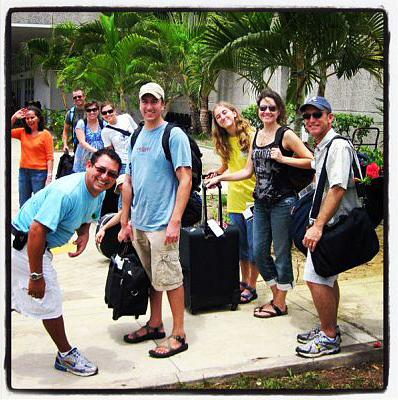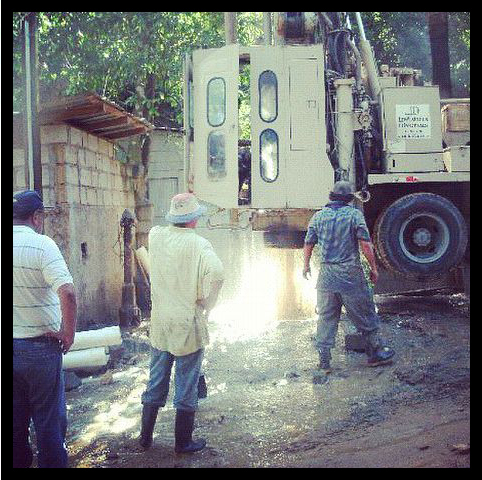Last July, I traveled to Roatan, Honduras with my husband Mike, oldest daughter Bailey and a team of family and friends. The following are journal entries from a week there.

Day 1. We arrive to a congested Customs line at an island airport, here on Roatan, off the coast of Honduras. A uniformed man with a gun holstered on his belt, stamps our passports. We follow the dense crowd to baggage carousels. Bags slowly circle on the worn, black belt. Passengers dart back and forth, picking up bags like birds snatching seeds from a feeder. We gather our bags and head out the double doors towards the sun. Henry and Frances from Living Water for Roatan meet us outside, in a hot breeze thick with salt and the smell of diesel. Old Toyotas sputter down the road, talking like women, an island Morse code of short and long beeps.
Henry introduces Enrique who drives us to Casa Isabella where we’ll eat and sleep all week. He’ll be our guide and translator for the week, coordinate local workers as needed. We park in the dirt driveway between the main house and the apartments. Enrique speaks English as he introduces Carlos, who owns Casa Isabella and lets its apartments to groups like ours. In orange stucco and whitewashed Roman columns, she sits twenty or so feet up the sandy shore on the Caribbean Sea. Coconut palms dot the sand yard. The unfamiliar sing-song of the birds here remind me we’re not in Florida.
Ten-year-old Carlito has come from Florida too. We meet him within seconds of climbing out of the truck. His mom lives in Orlando but has sent him here to Casa Isabella, to his dad Carlos for the summer. He haunts the house and grounds with the antics of a boy with ADHD, a boy whose friends are too far away to help him stave off the boredom of summer. We unpack and set off to explore the dock, Carlito at our heels.
Andrea is Carlos’ older daughter. She’ll cook our meals and keep the house running. Her boyfriend Elmer helps. They work side by side in the kitchen, cutting vegetables. Elmer’s hands are badly scarred from a machete. He fusses at Carlito. Elmer believes discipline will drive the impishness out of Carlito.

Well drilling
Before coming, we’d arranged everything with Henry. My brother-in-law’s church had made a large contribution to a project here. Friends and family wrote checks. We’d wired the money to dig a new well in La Colonia, an impoverished community set up on the hill along eroding, dirt roads. The nearest well was producing water once every ten days. We’d timed our trip to follow the well drilling rig by a few days, bringing a team of strong backs and willing hands to finish the work. But mostly we came because of Bailey.
Our oldest child, she’d heard our stories from past trips and set her thoughts and prayers on the people of La Colonia. She was persistent, eventually persuading her dad to organize a third trip to Roatan. This time, we’d raise funds to build another well. This time, we’d dig where the people were the poorest and hardest to get to, where they most suffered from the effects of dirty water. This time, fourteen-year-old Bailey would come too. I’d watch her wide eyes and giggles as the plane ascended through the clouds over Atlanta and banked to the south. And now I watch wide eyes again, as she strains to swallow the experience whole — the glittering Caribbean, the smells and sounds of Roatan.
The men meet to discuss plans for the week, and it’s decided we’ll hold a private church service at Casa Isabella in the morning. Then we’ll tour La Colonia and Nurse Peggy’s clinic. Monday we’ll start work on a pump house to enclose the well and gather kids up on the hill. We’ll love on them and tell them stories about God’s love.

oh so lovely.